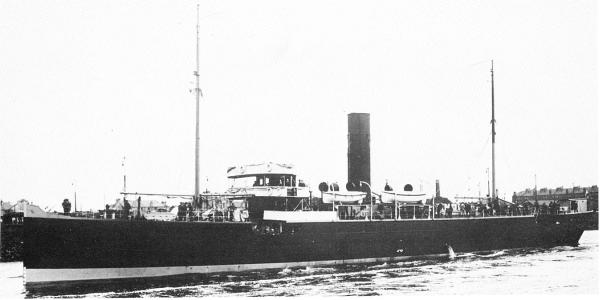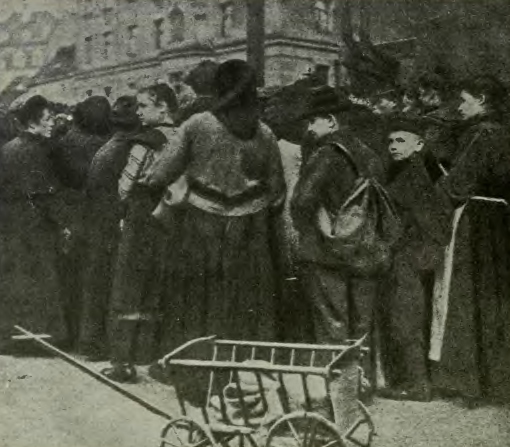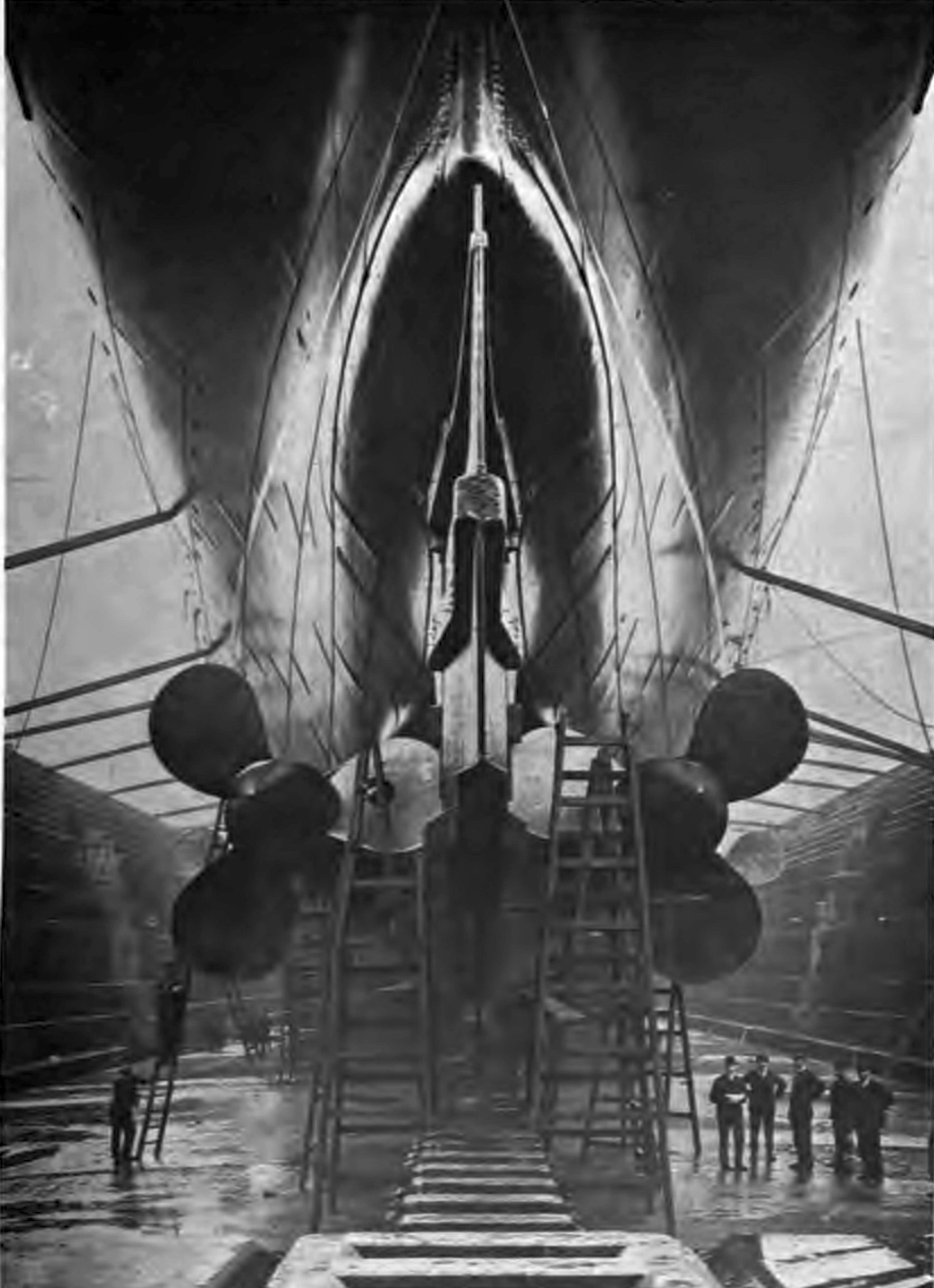|
RMS Lusitania
RMS ''Lusitania'' (named after the Roman province in Western Europe corresponding to modern Portugal) was a British ocean liner that was launched by the Cunard Line in 1906 and that held the Blue Riband appellation for the fastest Atlantic crossing in 1908. It was briefly the world's largest passenger ship until the completion of the three months later. She was sunk on her 202nd trans-Atlantic crossing, on 7 May 1915, by a German U-boat off the southern coast of Ireland, killing 1,198 passengers and crew. The sinking occurred about two years before the United States declaration of war on Germany. Although the ''Lusitania''s sinking was a major factor in building American support for a war, war was eventually declared only after the Imperial German Government resumed the use of unrestricted submarine warfare against American shipping in an attempt to break the Transatlantic supply chain from the US to Britain, as well as after the Zimmermann Telegram. German shipping l ... [...More Info...] [...Related Items...] OR: [Wikipedia] [Google] [Baidu] |
Ocean Liner
An ocean liner is a passenger ship primarily used as a form of transportation across seas or oceans. Ocean liners may also carry cargo or mail, and may sometimes be used for other purposes (such as for pleasure cruises or as hospital ships). Cargo vessels running to a schedule are sometimes called ''liners''. The category does not include ferries or other vessels engaged in short-sea trading, nor dedicated cruise ships where the voyage itself, and not transportation, is the primary purpose of the trip. Nor does it include tramp steamers, even those equipped to handle limited numbers of passengers. Some shipping companies refer to themselves as "lines" and their container ships, which often operate over set routes according to established schedules, as "liners". Ocean liners are usually strongly built with a high freeboard to withstand rough seas and adverse conditions encountered in the open ocean. Additionally, they are often designed with thicker hull plating than is found on ... [...More Info...] [...Related Items...] OR: [Wikipedia] [Google] [Baidu] |
Foreign, Commonwealth And Development Office
The Foreign, Commonwealth & Development Office (FCDO) is a department of the Government of the United Kingdom. Equivalent to other countries' ministries of foreign affairs, it was created on 2 September 2020 through the merger of the Foreign & Commonwealth Office (FCO) and the Department for International Development (DFID). The FCO, itself created in 1968 by the merger of the Foreign Office (FO) and the Commonwealth Office, was responsible for protecting and promoting British interests worldwide. The head of the FCDO is the Secretary of State for Foreign, Commonwealth and Development Affairs, commonly abbreviated to "Foreign Secretary". This is regarded as one of the four most prestigious positions in the Cabinet – the Great Offices of State – alongside those of Prime Minister, Chancellor of the Exchequer and Home Secretary. James Cleverly was appointed Foreign Secretary on 6 September 2022. The FCDO is managed day-to-day by a civil servant, the permanent under-secret ... [...More Info...] [...Related Items...] OR: [Wikipedia] [Google] [Baidu] |
Q-ship
Q-ships, also known as Q-boats, decoy vessels, special service ships, or mystery ships, were heavily armed merchant ships with concealed weaponry, designed to lure submarines into making surface attacks. This gave Q-ships the chance to open fire and sink them. The use of Q-ships contributed to the abandonment of cruiser rules restricting attacks on unarmed merchant ships and to the shift to unrestricted submarine warfare in the 20th century. They were used by the British Royal Navy and the German ''Kaiserliche Marine'' during the First World War and by the Royal Navy, the '' Kriegsmarine'', and the United States Navy during the Second World War (1939–45). Etymology Short for Queenstown in Ireland, as Haulbowline Dockyard in Cork Harbour was responsible for the conversion of many mercantile steamers to armed decoy ships in World War One, although the majority appear to have been converted in larger navy yards such as Devonport. Early uses of the concept In the 1670s, ... [...More Info...] [...Related Items...] OR: [Wikipedia] [Google] [Baidu] |
Cruiser Rules
Cruiser rules is a colloquial phrase referring to the conventions regarding the attacking of a merchant ship by an armed vessel. Here ''cruiser'' is meant in its original meaning of a ship sent on an independent mission such as commerce raiding. A cruiser in modern naval terminology refers to a type of ship rather than its mission. Cruiser rules govern when it is permissible to open fire on an unarmed ship and the treatment of the crews of captured vessels. During both world wars, the question was raised of whether or not submarines were subject to cruiser rules. Initially, submarines attempted to obey them, but abandoned them as the war progressed. Outline The essence of cruiser rules is that an unarmed vessel should not be attacked without warning. It can be fired on only if it repeatedly fails to stop when ordered to do so or resists being boarded by the attacking ship. The armed ship may only intend to search for contraband (such as war materials) when stopping a merch ... [...More Info...] [...Related Items...] OR: [Wikipedia] [Google] [Baidu] |
Royal Mail Ship
Royal Mail Ship (sometimes Steam-ship or Steamer), usually seen in its abbreviated form RMS, is the ship prefix used for seagoing vessels that carry mail under contract to the British Royal Mail. The designation dates back to 1840. Any vessel designated as "RMS" has the right both to fly the pennant of the Royal Mail when sailing and to include the Royal Mail "crown" insignia with any identifying device and/or design for the ship.Royal Mails employees Courier newspaper page 20 August 2007 It was used by many shipping lines, but is often associated in particular with the White Star Line, Cunard Line, Royal Mail Lines, Union-Castle Line, Canadian Pacific Line, Orient Line and the P&OSNC which held a number of high-profile mail contracts, and traditionally prefixed the names of many of their ships with the initials "RMS". While some lines in the past, particularly the Royal Mail Lines, called all their ships "RMS", technically a ship would use the prefix only while contracted t ... [...More Info...] [...Related Items...] OR: [Wikipedia] [Google] [Baidu] |
North Sea
The North Sea lies between Great Britain, Norway, Denmark, Germany, the Netherlands and Belgium. An epeiric sea, epeiric sea on the European continental shelf, it connects to the Atlantic Ocean through the English Channel in the south and the Norwegian Sea in the north. It is more than long and wide, covering . It hosts key north European shipping lanes and is a major fishery. The coast is a popular destination for recreation and tourism in bordering countries, and a rich source of energy resources, including wind energy, wind and wave power. The North Sea has featured prominently in geopolitical and military affairs, particularly in Northern Europe, from the Middle Ages to the modern era. It was also important globally through the power northern Europeans projected worldwide during much of the Middle Ages and into the modern era. The North Sea was the centre of the Viking Age, Vikings' rise. The Hanseatic League, the Dutch Golden Age, Dutch Republic, and the Kingdom of Grea ... [...More Info...] [...Related Items...] OR: [Wikipedia] [Google] [Baidu] |
World War I
World War I (28 July 1914 11 November 1918), often abbreviated as WWI, was one of the deadliest global conflicts in history. Belligerents included much of Europe, the Russian Empire, the United States, and the Ottoman Empire, with fighting occurring throughout Europe, the Middle East, Africa, the Pacific, and parts of Asia. An estimated 9 million soldiers were killed in combat, plus another 23 million wounded, while 5 million civilians died as a result of military action, hunger, and disease. Millions more died in genocides within the Ottoman Empire and in the 1918 influenza pandemic, which was exacerbated by the movement of combatants during the war. Prior to 1914, the European great powers were divided between the Triple Entente (comprising France, Russia, and Britain) and the Triple Alliance (containing Germany, Austria-Hungary, and Italy). Tensions in the Balkans came to a head on 28 June 1914, following the assassination of Archduke Franz Ferdi ... [...More Info...] [...Related Items...] OR: [Wikipedia] [Google] [Baidu] |
Blockade Of Germany
The Blockade of Germany, or the Blockade of Europe, occurred from 1914 to 1919. The prolonged naval blockade was conducted by the Allies during and after World War I in an effort to restrict the maritime supply of goods to the Central Powers, which included Germany, Austria-Hungary and the Ottoman Empire. The blockade is considered one of the key elements in the eventual Allied victory in the war. The German Board of Public Health in December 1918 claimed that 763,000 German civilians had already died from starvation and disease, caused by the blockade.C. Paul Vincent, ''The Politics of Hunger: the Allied Blockade of Germany, 1915–1919''. Athens, Ohio: Ohio University Press, 1985. p. 141 An academic study done in 1928 put the death toll at 424,000. An additional 100,000 people may have died during the post-armistice continuation of the blockade in 1919. Both Germany and the United Kingdom relied heavily on imports to feed their population and supply their war industry. Import ... [...More Info...] [...Related Items...] OR: [Wikipedia] [Google] [Baidu] |
British Admiralty
The Admiralty was a department of the Government of the United Kingdom responsible for the command of the Royal Navy until 1964, historically under its titular head, the Lord High Admiral – one of the Great Officers of State. For much of its history, from the early 18th century until its abolition, the role of the Lord High Admiral was almost invariably put "in commission" and exercised by the Lords Commissioner of the Admiralty, who sat on the governing Board of Admiralty, rather than by a single person. The Admiralty was replaced by the Admiralty Board in 1964, as part of the reforms that created the Ministry of Defence and its Navy Department (later Navy Command). Before the Acts of Union 1707, the Office of the Admiralty and Marine Affairs administered the Royal Navy of the Kingdom of England, which merged with the Royal Scots Navy and the absorbed the responsibilities of the Lord High Admiral of the Kingdom of Scotland with the unification of the Kingdom of Gr ... [...More Info...] [...Related Items...] OR: [Wikipedia] [Google] [Baidu] |
RMS Mauretania (1906)
RMS ''Mauretania'' was an ocean liner designed by Leonard Peskett and built by Wigham Richardson and Swan Hunter for the British Cunard Line, launched on the afternoon of 20 September 1906. She was the world's largest ship until the launch of in 1910. ''Mauretania'' became a favourite among her passengers. She captured the eastbound Blue Riband on her maiden return voyage in December 1907, then claimed the westbound Blue Riband for the fastest transatlantic crossing during her 1909 season, which she held both speed records for 20 years.Maxtone-Graham 1972, pp. 41–43. The ship's name was taken from the ancient Roman province of Mauretania on the northwest African coast, not the modern Mauritania to the south.Maxtone-Graham 1972, p. 24. Similar nomenclature was also employed by ''Mauretania''s running mate , which was named after the Roman province directly north of Mauretania, across the Strait of Gibraltar in Portugal. ''Mauretania'' remained in service until September 1934, ... [...More Info...] [...Related Items...] OR: [Wikipedia] [Google] [Baidu] |
.jpg)






